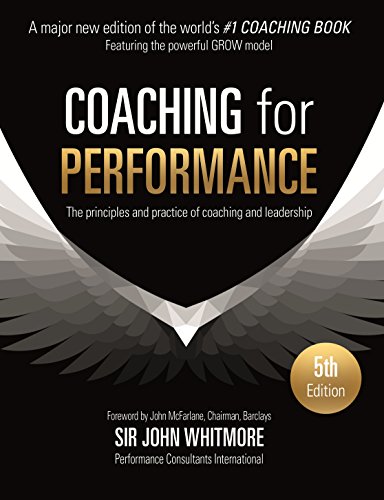Here are my notes from the book Coaching for performance by Sir John Whitmore.
Coaching focuses on future possibilities, not past mistakes.
Coaching is unlocking peoples potential to maximize their own performance. It is helping them to learn rather than teaching them.
If blame and criticism are a prevalent communication style and this doesn’t change, relationship failure can be predicted with over 90% accuracy.
Of the spoken word: 7% in words, 38% in the way the words were said, 55% facial expression.
I think this person:
– Is a problem
– Has a problem
– Is on a learning journey and is capable, resourceful and full of potential
Intentionality – set a clear intention for a meeting. 2 min before a meeting: “if the meeting would wildly exceed your expectations, what would happen?” No limits!
Questions for building a great team:
– What would the dream or success look for us working together?
– What would the worst case look like
– What’s the best way for us to achieve success or dream
– What do we need to be mindful of to avoid the worst case
– What permissions each of us wants from each other
– What will we do when things get hard?
Open questions:
– What do you want to achieve
– What’s happening at the moment
– How would you like it to be
– What’s stopping you
– What’s helping you
– What problems might there be
– What can you do
– Who can help you
– Where can you find out more
– What will you do
Don’t ask WHY question => ask “what were the reasons” instead
Don’t ask HOW question => ask “what are the steps” instead
Top 10 questions in coaching:
– If I wasn’t here what would you do
– If you knew the answer, what would it be
– What if there were no limits
– What advice would you give to your friend in the same situation
– Imagine having a dialog with the wisest person you know; what would they tell you to do
– What else?
– What would you like to explore next
– I don’t know where to go next, where would you like to go
– What is the real issue
– What is your commitment on a scale from 1 to 10 to doing it. What can you do in doing it
1on1s:
– Goal setting for the sessions (both long and short-term)
– What do you want?
– Reality check to explore the current situation
– Where are you now?
– Options and alternative strategies
– What could you do?
– Will – What is to be done, when, by whom, and a will to do it
– What will you do?
SMART, PURE and CLEAR goals
Having a big dream brings as much work as a small dream.
To set up accountability:
– What will you do
– When
– How will I know
70 learning through experience on the job
20 learning from other people
10 formal learning
Feedback framework:
– What happened
– What have you learned
– How to use this knowledge in the future
Discussion may be facilitated by the team leader but what happens should be decided by team members.
Bonding opportunity by doing something together.
Our true values reside within us and at the deepest level, those values are universal.


